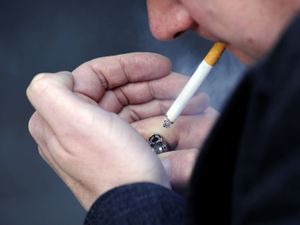Health
Study Links Fathers’ Teenage Smoking to Faster Aging in Children

Research presented at the European Respiratory Society Congress in Amsterdam indicates that individuals may experience accelerated biological aging if their fathers smoked during puberty. The study highlights a potential connection between paternal smoking habits and the health of future generations, particularly concerning the biological aging process.
The investigation focused on examining the epigenetic markers of aging in the DNA of 892 participants from various European countries and Australia, ranging in age from seven to 50. Researchers looked for changes in blood samples that could indicate biological age, often referred to as an epigenetic clock. The participants provided information about their smoking history as well as that of their parents, specifically noting when their fathers began smoking.
Findings revealed that individuals whose fathers started smoking at age 15 or younger exhibited biological aging approximately nine months to a year older than their chronological age. Notably, this effect was more pronounced among those who had also smoked. Conversely, individuals whose fathers began smoking later in life showed only a minimal increase in biological age, and no significant patterns were noted for those whose mothers smoked prior to pregnancy.
Dr. Juan Pablo Lopez-Cervantes from the University of Bergen led the study and stated, “Our research group has previously shown that smoking during puberty may harm not only the person who smokes but also their future children.” He emphasized the importance of understanding how parental behaviors during formative years can influence health outcomes for subsequent generations.
The implications of accelerated biological aging are concerning, as research has linked this phenomenon to a higher risk of diseases such as cancer, arthritis, and dementia. Dr. Lopez-Cervantes noted that smoking during puberty could alter the epigenetic composition of sperm cells, potentially passing harmful changes to offspring.
As the study’s findings emerge, the urgency for preventative measures against adolescent smoking becomes clear. Dr. Lopez-Cervantes advocates for stronger tobacco control policies aimed at protecting young boys from the harms of nicotine. “Such efforts could benefit not only current generations but also those in the future,” he added.
Sarah Sleet, chief executive of Asthma and Lung UK, echoed these sentiments, stressing the need for comprehensive public health initiatives to deter smoking among youth. She stated, “This research highlights why we must do everything we can to keep children away from smoking and help them stop if they have started.” Sleet emphasized the necessity of adequate funding for smoking cessation services, noting their potential to not only save lives but also reduce healthcare costs.
Dr. Stamatoula Tsikrika, chairwoman of the European Respiratory Society’s expert group on tobacco, smoking control, and health education, remarked on the broader implications of the study. “What we’re starting to learn is that the damage caused by smoking can persist across generations,” she said.
While rates of teenage smoking appear to be declining, the increasing prevalence of vaping raises additional concerns. Dr. Tsikrika highlighted the need for continued vigilance regarding nicotine addiction, urging policymakers to prioritize the protection of children and adolescents from both smoking and vaping.
Overall, this research presents a compelling case for reevaluating strategies to combat tobacco use among young people, emphasizing the potential long-term consequences of smoking behavior initiated during critical developmental periods.
-

 Entertainment3 months ago
Entertainment3 months agoAnn Ming Reflects on ITV’s ‘I Fought the Law’ Drama
-

 Entertainment4 months ago
Entertainment4 months agoKate Garraway Sells £2 Million Home Amid Financial Struggles
-

 Health3 months ago
Health3 months agoKatie Price Faces New Health Concerns After Cancer Symptoms Resurface
-

 Entertainment3 months ago
Entertainment3 months agoCoronation Street’s Carl Webster Faces Trouble with New Affairs
-

 Entertainment3 months ago
Entertainment3 months agoWhere is Tinder Swindler Simon Leviev? Latest Updates Revealed
-

 World2 weeks ago
World2 weeks agoBailey Announces Heartbreaking Split from Rebecca After Reunion
-

 Entertainment2 weeks ago
Entertainment2 weeks agoCoronation Street Fans React as Todd Faces Heartbreaking Choice
-

 Entertainment4 months ago
Entertainment4 months agoMarkiplier Addresses AI Controversy During Livestream Response
-

 Science1 month ago
Science1 month agoBrian Cox Addresses Claims of Alien Probe in 3I/ATLAS Discovery
-

 Health5 months ago
Health5 months agoCarol Vorderman Reflects on Health Scare and Family Support
-

 Entertainment4 months ago
Entertainment4 months agoKim Cattrall Posts Cryptic Message After HBO’s Sequel Cancellation
-

 Entertainment3 months ago
Entertainment3 months agoOlivia Attwood Opens Up About Fallout with Former Best Friend





















